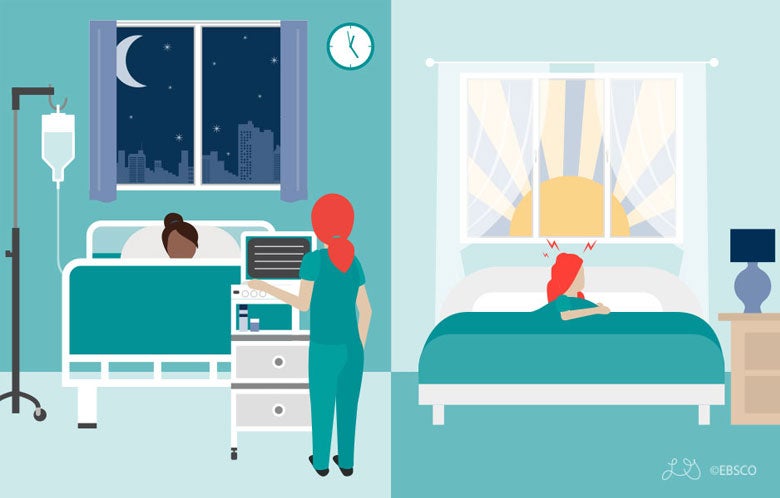The American Academy of Sleep Medicine states that getting enough sleep is just as important as eating right and exercising. Sleep deprivation, sleep-wake disorders or shift worker sleep disorder are some of the issues impacting sleep.
Sleep deprivation (SD) can result in cognitive impairment. SD may impair performance in tasks that require vigilance, decision making, and memory planning, which are commonly required in shift work (e.g., health care and emergency services). It can result in accidents both on and off the job when not managed properly.
Sleep-wake disorder (SWD) in shift workers or shift work sleep disorder (SWSD) refers to a circadian rhythm sleep disorder characterized by symptoms of insomnia and/or excessive sleepiness in association with working a "nontraditional" schedule (one that conflicts with natural, endogenous sleep-wake rhythms).
Your health can truly suffer if you're constantly shortchanging yourself on sleep. Heart disease, diabetes and obesity, improper digestive function, increased risk of cancer and car accidents are reasons to take a closer look at the type and length of sleep you are getting.
The Cleveland Clinic estimates that between 10 to 40 percent of shift workers experience SWSD. Those who have regularly shifting schedules are most likely to be affected. In addition, daytime sleep is not equivalent to nighttime sleep in either quality or duration. This can make recovery for individuals who work the night shift difficult. Many think that as long as they can still function, they must be getting enough sleep.
The Cleveland Clinic estimates that between 10 to 40 percent of shift workers experience SWSD.
The Cleveland Clinic estimates that between 10 to 40 percent of shift workers experience SWSD.
If you have symptoms, diagnosis can be confirmed by a 14-day sleep log and/or actigraphy. Actigraphy is a non-invasive method of monitoring human rest/activity cycles usually worn on the wrist such as a Fitbit. Subjective sleep scales such as the Stanford Sleepiness Scale and Epworth Sleepiness Scale, found in DynaMed Plus™ calculators, can be administered to measure sleepiness.
While many employees aren’t able to change their work hours, there are lifestyle changes that can lessen and manage the effects of SWSD. A multimodal approach involving sleep scheduling, sleep hygiene measures, exercise, healthy diet, melatonin, light therapy and enlisting family and social support can help to alleviate the symptoms of SWSD.
- Establish a consistent bedtime routine that includes relaxation activity. Try to keep a regular sleep schedule, including on days off. Take naps when possible (for example, a 30- to 60-minute nap right before your shift). Maintain regular sleep-wake times that allow for an appropriate amount of time in bed every day.
- Avoid late-day/night eating, especially of foods or beverages containing caffeine. Limit caffeine intake four hours before bedtime.
- Avoid physical or mental stimulation (e.g., exercising, reviewing work information) just before bedtime.
- Create a sleeping area that is quiet and dark, has a comfortable temperature and is free of stimulation (e.g., pagers, cell phones). Use white noise, eyeshades and/or ear plugs.
- Wear sunglasses when leaving work to minimize sun exposure. Doing so can help prevent the “daytime” clock from activating. Purchase a light box for light therapy to expose your eyes to extremely bright but safe light before work.
- Maintain a healthy diet rich in fruits and vegetables.
- Ask family and other live-in companions to reduce noise by using headphones to watch television, listen to music and other noise reducing techniques.
- Keep pre-sleep rituals before bed, even during the daytime.
- American Academy of Sleep Medicine (AASM) recommends melatonin for shift work disorder.
- 3mg melatonin may mildly improve sleep efficiency and sleep onset latency in night-shift workers with difficulty falling asleep
- Avoid bright light in early morning for melatonin to exhibit full effect
- Patient should avoid cognitive intense tasks for several hours after taking melatonin as it may lead to impaired performance
Following these tips will give you a head start down the path to better sleep.
Like what you read? This content was created using the latest clinical evidence-based information found in a variety of EBSCO Health products, including DynaMed Plus, Dynamic Health™ and Nursing Reference Center™ Plus.



